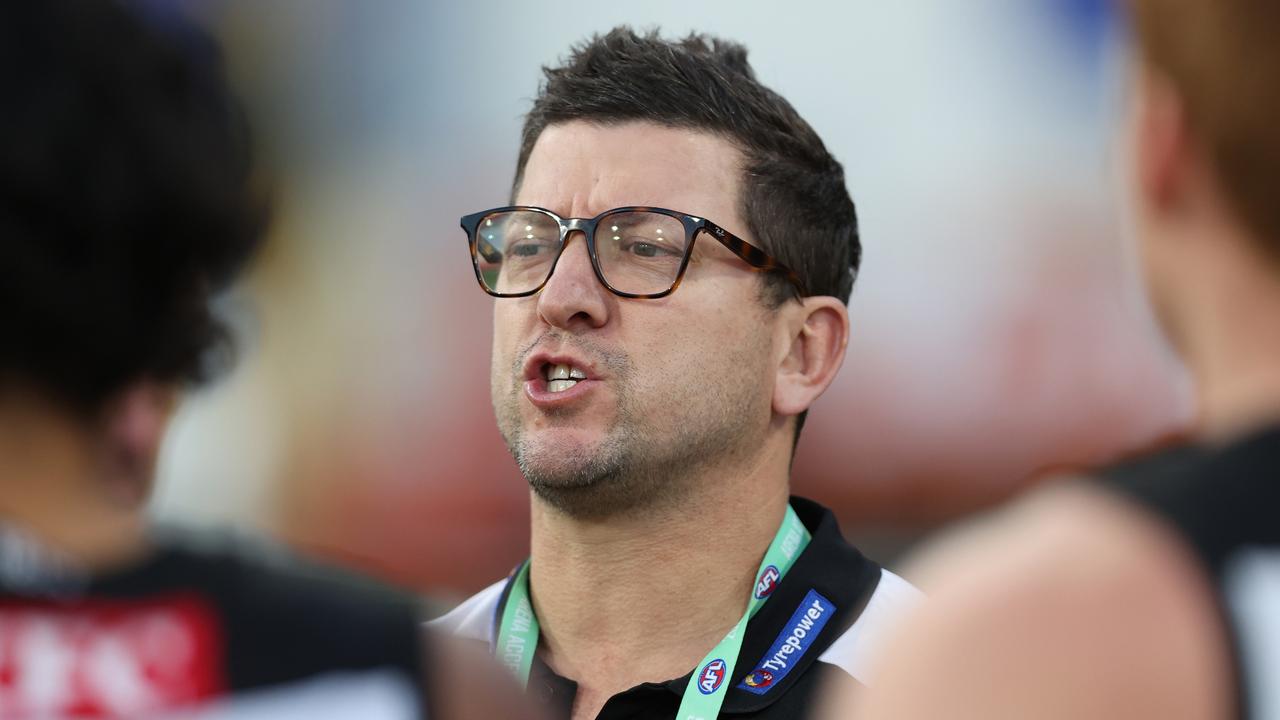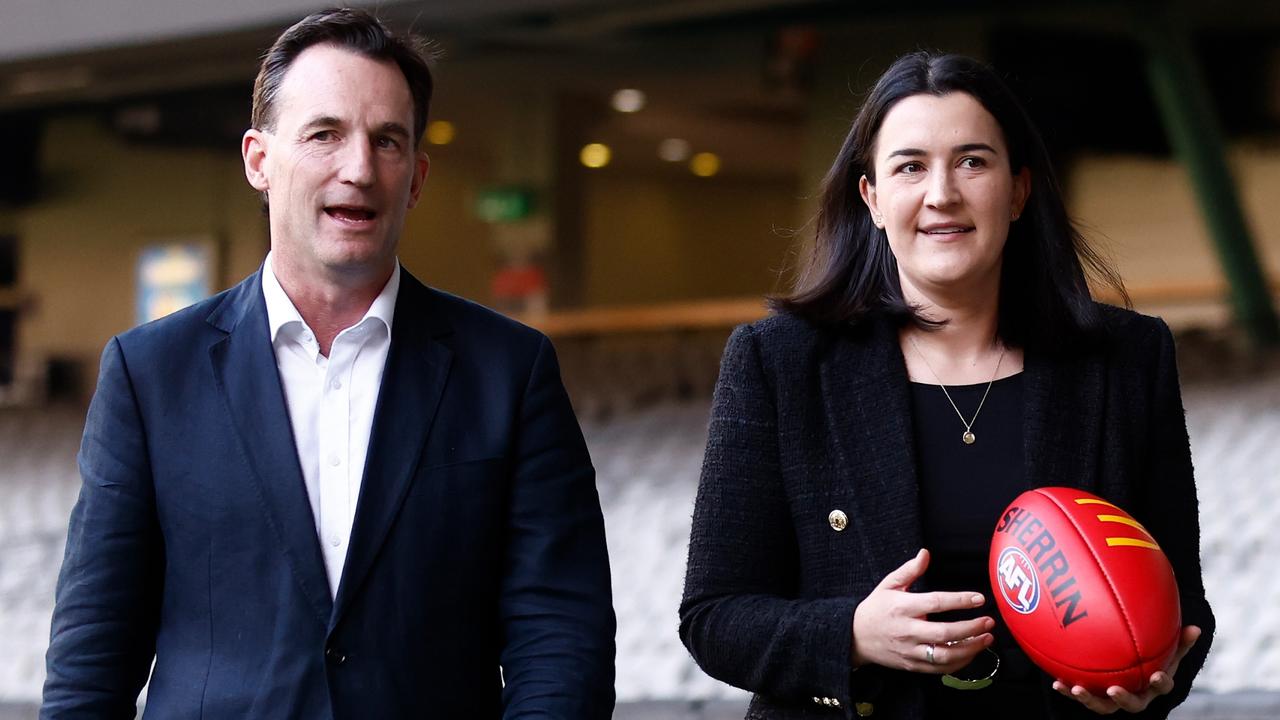Leigh Matthews open to AFL Commission role, involved in discussions with league
Leigh Matthews’ media career is coming to an end, but a big spot in AFL House could be up for grabs. The Hawthorn champion is open to conversations.
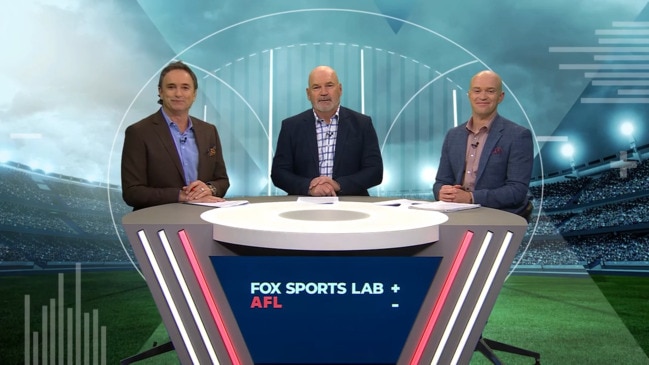
AFL
Don't miss out on the headlines from AFL. Followed categories will be added to My News.
Leigh Matthews says he is open to a formal approach to join the AFL Commission as he winds down his successful media career.
A player widely acclaimed as footy’s greatest player and a four-time premiership coach confirmed on Friday night he had been involved in early discussions last year about a commission role.
The AFL has told potential candidates it has postponed elevating new commissioners until Gillon McLachlan’s replacement is found, likely to be after the May 9 budget that decides the fate of the 19th AFL licence in Tasmania.
But Hawthorn champion Matthews said the league was interested in football figures in the northern states and West Australia and had asked him last year about his interest in filling one of two vacant positions.
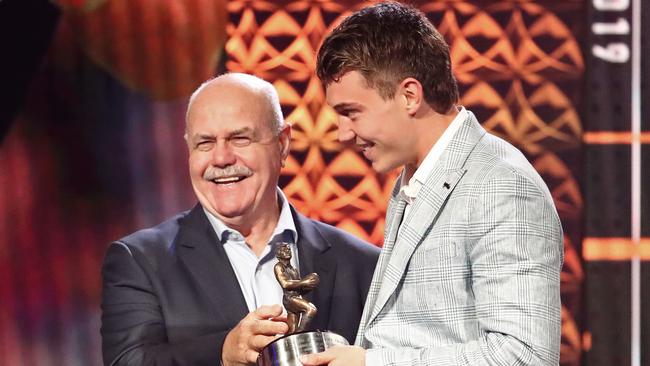
Brisbane and Collingwood premiership coach Matthews told 3AW he had not had to make a decision about giving up his media and Lions board roles given the postponed appointments.
But he conceded he was interested in exploring what a commission role might look like.
“I have had a couple of conversations way back. Not for months because it’s all been put on hold. Only a couple of conversations and I expressed some interest. It’s a volunteer role and you can’t do media. I had a couple of conversations in the last 12 months but everything has been put on hold. But that is why my name popped up. There were a couple of conversations. “Are you interested?” And I said, “Oh yeah, I might be interested.”
“The conversation would only go anywhere if there was genuine interest in me being a candidate they thought would be good for the commission.”
The Herald Sun on Friday reported Matthews was one of the potential replacements which also include Joel Selwood and former Sydney boss Andrew Ireland.
“I am not positive I want to do it but the media will finish in due course, any year now. So it’s just more there have been a couple of conversations but not in depth,” Matthews said.
“They have been looking for a person or two from the northern states or WA, which is why Matthew Pavlich’s name popped up. Andrew Ireland, would be an ideal candidate too. The idea was they needed a couple of football background people.”
AFL MEMO ISSUED AS DANGEROUS TACKLE DEBATE RAGES
The AFL has reminded clubs it will penalise players for tackles which involve double movements, have “excessive rotation” or drive an opponent into the ground as debate rages about the definition of dangerous tackles.
In a memo sent to clubs on Thursday and seen by the Herald Sun the league made clear exactly what constitutes a dangerous tackle.
Clubs had inquired of the AFL about whether the definition had changed but the league’s stance is unwavering and its umpires have not been coached differently this week.
The league also reminded coaches that the MRO and tribunal “must factor the potential to cause injury” into the determination of impact gradings, including “any dangerous tackle”.
Essendon coach Brad Scott on Friday cited that memo and said ball carriers should have a greater responsibility for their own safety as the AFL grapples with how to protect players’ heads.
As the Bombers prepare for Anzac Day without Zach Merrett after the captain was banned for one week for a dangerous tackle, Scott says his players are not confused by how to meet the stricter new MRO interpretation but are having trouble executing on the field.
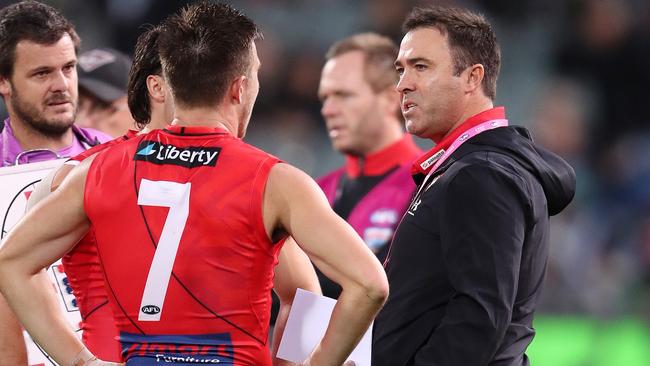
“No there’s not confusion, and the AFL sent out absolute clarity again last night in terms of clarifying what constitutes a dangerous tackle and all the factors that go into that,” Scott said.
“But there’s a very big difference between understanding what is acceptable and what’s not, and executing that.”
In the memo the league told clubs the dangerous tackle interpretation remained unchanged since the previous crackdown in February 2021.
The league said an umpire would award a rough conduct free kick for a dangerous tackle where a player executes a tackle in which:
– The tackled player’s head is in a vulnerable position; and/or,
– There is excessive or unreasonable rotation; and/or,
– An arm or both arms are pinned (that leaves a player vulnerable); and/or;
– The legs of the tackled player are lifted, this includes but is not limited to legs going past the horizontal; and/or,
– The tackle is unreasonable in the circumstances (i.e., forceful, drives the player to the ground, the tackle has an excessive second action).
The league said in its memo of the capacity to cause serious injury clause: “This will particularly apply when there is a dangerous tackle and the tackled player’s head consequently hits the ground, consistent with dangerous tackles charged by the MRO in the 2023 AFL Premiership Season”.
Scott said he understood the definition of a dangerous tackle but sympathised with players trying to weigh aggressive tackles with the duty of care to their opponent.
“So I really feel for players who are trying to be aggressive in a tackle, but yet showing duty of care all at the same time,” he said.
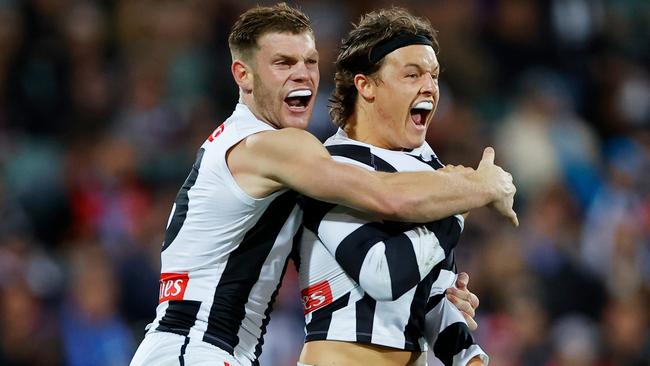
“I think the players are clear (on the requirements), but they’re not clear on how to exactly execute that.” That’s going to be an ongoing discussion for the whole industry to address, because we all agree that we don’t want to see players get hurt, but we’ve also I think got to put some onus on the ball carrier that they’ve got a responsibility also to protect themselves.”
Scott says the player with the ball should have more responsibility for themselves, but their options are limited when it comes to avoiding going to ground.
“But I feel for them, because if you’ve got one arm pinned, and you’ve got the ball in the other hand, if you get tackled your only option to protect yourself is to drop the ball and brace your fall, so the challenge for players is they either risk concussion if they don’t drop the ball but they get pinged holding the ball if they do drop it … the execution is more difficult than the understanding of the rule.”
Scott said other sports including American football were already contending with how to make the ball carrier more accountable for their own safety.
“I think everyone’s got a responsibility. If you look at world sport all over, in the NFL they wear helmets to protect the head but over time the helmet became an attacking weapon and players led with their head to try and get an advantage,” he said.
“I think the onus is on everyone, not just the tackler.”
More Coverage
Originally published as Leigh Matthews open to AFL Commission role, involved in discussions with league



